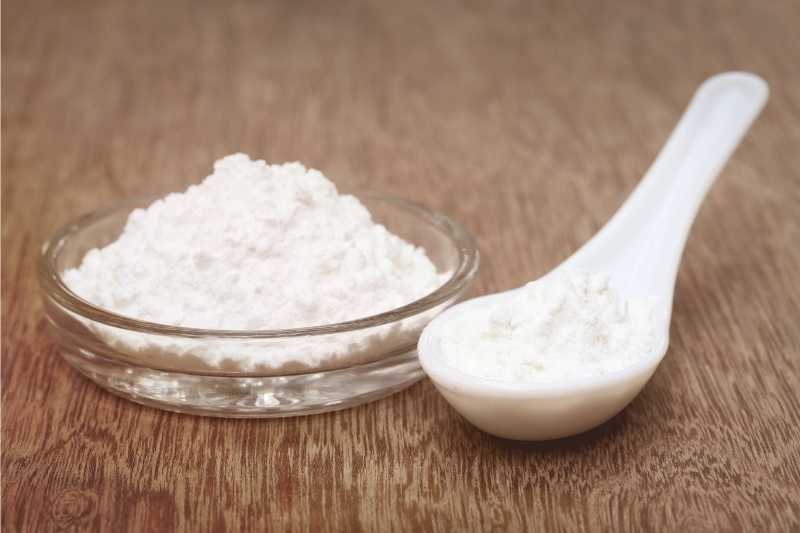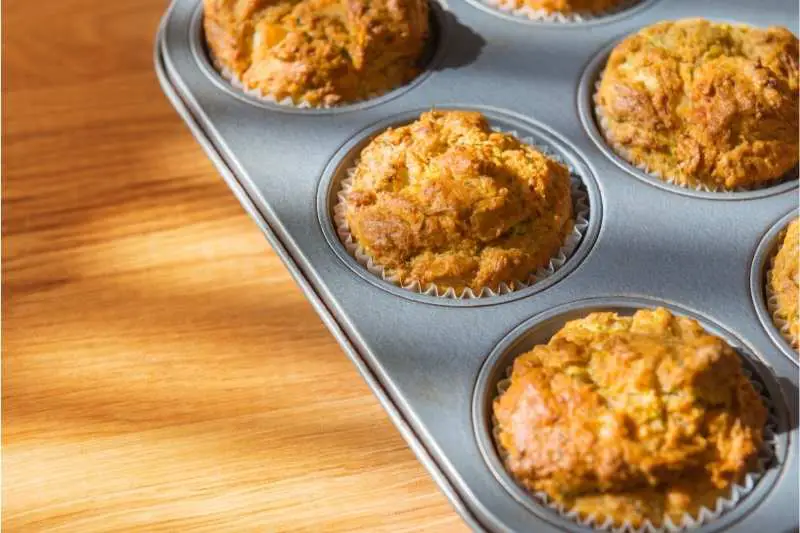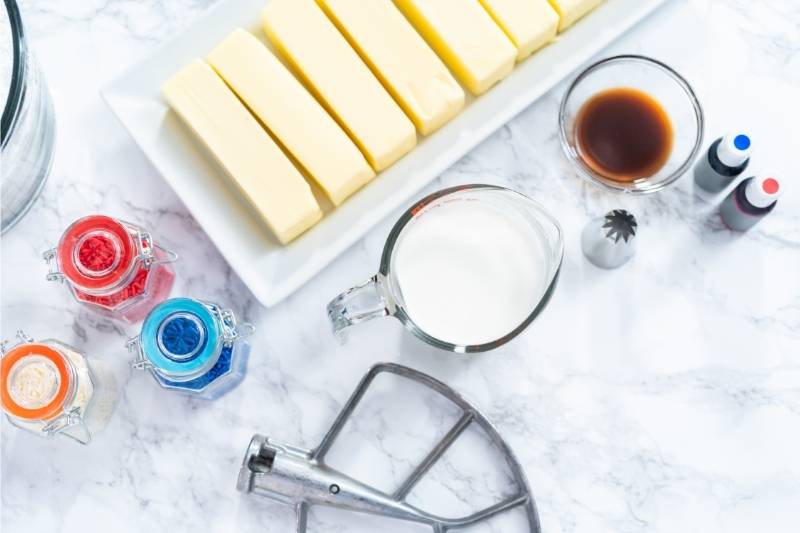This post contains affiliate links.
Muffins are a delicious breakfast, whether they have fruit filling or not. Sometimes, however, your muffins can turn out dry and crumbly – which is never the desired outcome. Throughout my years of baking muffins, I’ve realized how important it is to prevent a crumbly muffin that comes out dry!
As a general rule, the most common reason muffins will become crumbly and dry is improperly measuring the ingredients used in the batter. While baking muffins, there has to be a precise measurement of ratios between the wet and dry ingredients in order to keep muffins fluffy and moist.
While using the right ratios of ingredients is the most common reason muffins are crumbly, there are a lot more reasons that I’ve come across that make your muffins crumbly and dry. In this article, I’ll explore all the reasons why muffins may turn out dry and what you can do to prevent it from happening in the future.
Why Are My Muffins Crumbly?
Muffins will become crumbly because of several reasons: if you overbeat the batter, overbake them, bake them at the wrong temperature, or use too much flour than necessary. These reasons give your muffins a greater chance to become crumbly after they’re baked.
I avoid all of these issues by simply using a Digital Scale which is a lifesaver in my kitchen. I recommend using a Nicewell Digital Food Scale which runs on batteries making it a wireless, hassle-free option. You can find it on Amazon!
Let’s have a closer look at these and other reasons for crumbly muffins:
You used the wrong ingredient ratios
Measuring the ingredients incorrectly is among the major reasons why muffins turn out dry and crumbly. The right ratios of wet to dry ingredients are crucial in ensuring that your muffin will be fluffy and moist.
The oven wasn’t preheated enough
If the oven isn’t heated properly before you put the muffins in, they may not cook evenly and will end up being dry.
You used baking powder that was too old or expired
If the baking powder you are using is old, it won’t rise when baked, and your muffin will turn out dry. Always make sure to check whether the expiration date on the package has passed before putting anything in your oven.

Expired ingredients lose their strength making them unable to do what they were made for!
*By the way, you might also want to know If Cornstarch Can Replace Baking Powder. I recently wrote an article about Baking Powder Substitutes That Work, you can check it out here!
You might have used vegetable oil spread
In my experience, muffins often turn out crumbly when vegetable oil spread is used as the fat. If you’re looking for a more moist and fluffy muffin, it’s best to avoid this ingredient.
You overbaked the muffins
Overbaking is another common reason for muffins being crumbly and falling apart. Make sure to keep an eye on them while they’re in the oven so that they don’t overcook.
Follow the baking instructions of your recipe to avoid any problems.
You used “light” or “diet” margarine
This product contains more water than regular margarine, and the resulting muffin may turn out crumbly. Ensure to use regular butter or a similar product that has no additional ingredients for baking purposes.
You added too much moisture from other ingredients
This is another issue you’ll want to avoid – adding excess liquid can make your muffins fall apart if they’re not baked adequately.
The best way to ensure they don’t turn out crumbly is by reading the instructions of your recipe carefully and following them step-by-step.
*Side Note: You might also want to know Why Your Muffins Crack On Top after they’re baked. I recently wrote an article that talks about How To Fix and Prevent Dry Muffins, you can check it out here!
Why Are My Muffins Dry?
As a general rule, your muffins become dry because you overbaked them. When muffins are overbaked, the moisture from within the muffins evaporates because of excess heat. This makes the muffins smaller in size while making them dense and dry.
Other reasons for muffins being dry may include:
You Used Too Much Flour
This is especially important to keep in mind if you’re using self-rising flour. Adding too much flour will make your muffins dry and crumbly, so it’s best to measure carefully or use a kitchen scale for more accurate results.
Overmixing the batter is also a common contributor to this issue. Be careful not to over-mix the ingredients and always follow the recipe instructions closely.
*By the way, I recently wrote an article about How to Aerate & Measure Flour The Right Way. This article talks about all the things you need to know to make sure you properly use flour when baking. You can check out this article here!
You Cooled Them for Too Long
After removing the muffins from the oven, they should be cooled on a wire rack for about 15-30 minutes.
If you leave your muffins in the pan to cool completely or too long at that, they may turn out dry and dense because of moisture loss during cooling. This is because the pan will retain its heat longer than the muffins!

You Used the Wrong Substitutions
This is another issue I often see when people try to adapt recipes. If you want your muffins to turn out moist and fluffy, don’t substitute baking soda for baking powder or use buttermilk instead of regular milk in the recipe – these ingredients will affect the final result of your product.
*By the way, I recently wrote an article about How to Store Muffins to Keep Them Fresh for Longer. This article talks about the proper ways to store muffins at room temperature, in the fridge, and in the freezer to keep them fresh. You can check out this article here!
How to Fix Crumbly Muffins?
You can fix crumbly muffins by making a “soaker” syrup or a “wet glaze” and brushing it over the top of each muffin. The soaker syrup is made by dissolving some sugar in lemon juice or water and heating it until the sugar has dissolved. This mixture is then sprinkled over the crumbly muffins.
The wet glaze can also be made by whisking together some melted butter, milk or cream, and confectioners’ sugar until smooth. You can also add a little vanilla extract or almond extract if you’d like.
*Side Note: You might also want to know Why Your Muffins Didn’t Rise the way they were supposed to. I recently wrote an article talking about Tips For Preventing Flat Muffins, you can check it out here!
How to Prevent Crumbly Muffins?
To prevent crumbly muffins, you want to measure the ingredients correctly. Follow the muffin’s recipe precisely to measure the correct ratios of wet to dry ingredients. If there are more dry ingredients than wet ingredients, it will cause the batter to clump making the muffin crumbly.
Here are more ways to help prevent your muffins from turning out dry:
Don’t overbake the muffins
Peep an eye on them while they’re in the oven, so they don’t get too brown or overcooked. Overbaked muffins will always turn out dry.
Use the right type of butter
If a recipe calls for butter, don’t use margarine. If it asks for oil, don’t use vegetable spread. Be mindful of the different effects that various ingredients have on a recipe and make the appropriate substitutions to help prevent dry muffins.

The best tool that I’ve found to sift my flour is a Battery Operated Electric Flour Sifter For Baking. This wonderful tool automates all of my sifting needs in the kitchen! It has a 4-cup capacity and is washable. What else do you need in an automatic sifter? You can check out this Electric Flour Sifter on Amazon!
Bake at the right temperature
Preheat the oven and keep the temperature at or below 375 degrees Fahrenheit to avoid overbaking.
Don’t let them sit in the pan for long
As soon as you take your muffins out of the oven, transfer them to a wire rack so they can cool evenly instead of staying hot and moist inside their baking pans.
This will help prevent moisture loss and ensure that they’ll be fluffy and moist when you finally eat them.
Measure the ingredients accurately
This is a key step for ensuring your muffins turn out correctly – if you use too much or too little of an ingredient, it can spoil the batch. Use a kitchen scale for more accurate measurements, or measure ingredients using leveled tablespoons or cups.
Avoid using “light” or “diet” margarine products
As I mentioned earlier, these products tend to have more water in them and can make baked goods turn out dry. If you’re looking for a lower-fat option, try using unsalted butter instead.
*Side Note: You might also want to know How To Stop Cupcake & Muffin Liners From Folding In and Sticking. I recently wrote an article that explains How To Keep The Liners Looking Good When Baking In Them, which you can check out here!
Why Are My Muffins Moist But Crumbly?
Your muffins can turn out moist but crumbly if you overmix the batter or add too much flour. Muffins that are moist but crumbly can also be caused by using ingredients with different properties, such as using all-purpose flour when self-rising flour is required in a recipe.
When baking desserts, it is important to follow the recipes exactly as they’re portrayed. This is because many baking ingredients create volatile reactions with one another making the mixture volatile as well!
It is always important to follow the recipe exactly as it is written and to measure the ingredients correctly. Other causes of moist but crumbly muffins can be due to incorrect oven temperature or overbaking.
*By the way, I wouldn’t be able to fix my grainy buttercream frosting if I didn’t have the right type of mixer. For this situation, I used a 5-Speed Electric Hand Mixer which can get the job done! You can check out the Hand Mixer I use on Amazon here!
To Summarize…
Dry and crumbly muffins are a common baking issue that can be caused by a number of things. By following the tips above, you can help prevent your muffins from becoming dry and crumbly in the first place, or fix them if they have already become this way. Happy baking!
